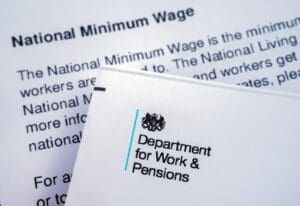HMRC has ramped up its enforcement of National Minimum Wage (NMW) compliance, resulting in £13.7 million in penalties levied against employers during the 2022/23 tax year.
This enforcement push follows the government’s increasing focus on NMW violations, supported by a doubling of HMRC’s enforcement budget to £27.8 million compared to 2015/16.
A recent report by the Department for Business and Trade (DBT) highlights the impact of this enforcement, revealing that more than 108,000 workers were paid NMW arrears after investigations into non-compliance. HMRC closed nearly 3,200 cases, with 900 of them uncovering unpaid wages. The report underscores HMRC’s growing use of the Geographical Compliance Approach (GCA), a targeted three-tiered enforcement method designed to bring employers in specific regions into compliance with NMW regulations.
Under the GCA, employers are encouraged to address NMW arrears voluntarily, but if issues persist, HMRC can impose penalties of up to 200% of the arrears owed. During 2024, three more regions—Liverpool, East Midlands, and another to be announced—will be added to the GCA, following the addition of locations like Belfast, Cornwall, and Watford.
Kyle Newton, Head of National Minimum Wage at Azets, commented on the report: “The sheer scale of HMRC enforcement highlights how widespread NMW non-compliance is. Businesses must review their payroll records and ensure they are adhering to the rules before they face unexpected penalties and reputational damage.”
The government remains clear on its stance, with the DBT stating: “The enforcement of the minimum wage is essential, and we are committed to cracking down on employers who break the law across all sectors.”
The penalties and arrears identified by HMRC in the past year reflect the heightened awareness among workers about their rights, partly driven by campaigns like “Check Your Pay” and direct communication from HMRC to millions of workers.
Businesses across the UK are being urged to take proactive steps to ensure NMW compliance, particularly in light of expected increases to the minimum wage rate, which is predicted to exceed £12 per hour in April 2025. Employers who fail to address discrepancies in pay or working time practices could face further penalties, including public naming by HMRC.
As HMRC’s enforcement activity continues to grow, businesses should review their payroll controls and seek professional advice to mitigate financial and legal risks.
Read more:
HMRC imposes £13.7 million in penalties following National Minimum Wage enforcement action

